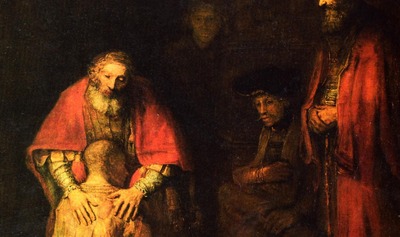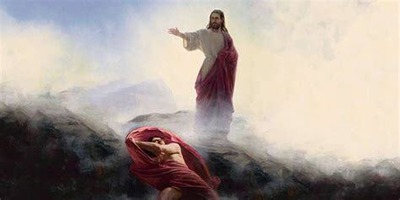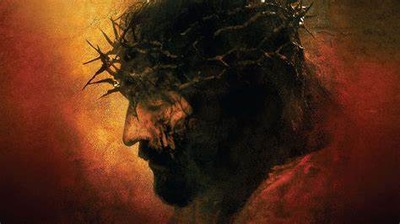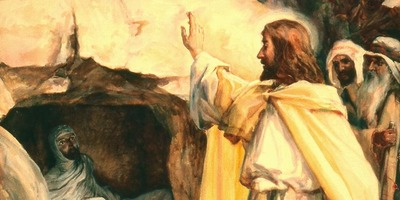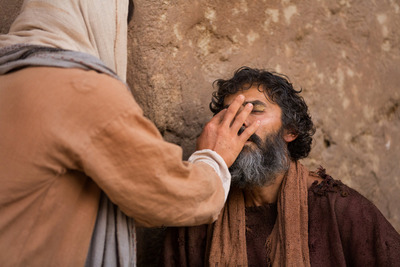March 2, 2025
|by N W
|
0 Comments
|
Deacon Mark, Forgiveness, Holy Spirit, Lent, Reconciliation, Repentance, Self-Reflection
Eighth Sunday in Ordinary Time
March 2, 2025 — Year C
Readings: Sir 27:4-7 / Ps 92 / 1 Cor 15:54-58 / Lk 6:39-45
by Rev. Mr. Mark De La Hunt, Permanent Deacon
Jesus said, “When fully trained, every disciple will be like his teacher.” (Lk 6:40) Our teacher is Jesus who is God. How can we be like God? St. Gregory of Nyssa said that to become like God, one must live a virtuous life. (CCC 1803) Lent begins this coming Wednesday. It is a season for us to replace vices and distractions with prayer and virtuous acts. In preparation for Lent, in this homily we will reflect on our fallen human nature and on how practicing virtue with Jesus’ grace and the power of the Holy Spirit helps us become like God.
Fr. Pablo T. Gadenz says, “In asking us to remove the beam in our eye first, Jesus is teaching us the lesson of not judging others’ faults without first addressing our own worst faults.” Fr. Gadenz, in his commentary on Luke’s gospel, says this is not meant to say we cannot correct someone who is in sin, for Jesus said, “If your brother sins, rebuke him; and if he repents, forgive him.” (Lk 17:3) But Jesus was saying that “we should not have a critical spirit” like the scribes and the Pharisees who “watched Him closely…so that they might discover a reason to accuse Him.” (Lk 6:7)
Regarding accusing others with a critical spirit, we would do well to remember that in Revelation, the Apostle John called Satan an accuser. “For the accuser of our brothers is cast out, who accuses them before our God day and night.” (Rev 12:10) Why do we tend to be accusers of others?
One reason is because it is easier to try to fix someone else than to battle our own weaknesses. Another is that our ego is fragile, because we have centered our life too much on self and not enough on Jesus. In this weakness, we accuse others to make ourselves feel better about our own faults. We must be careful not to feed this instinct. Could there be a dark reason that streaming reality shows of men and women behaving badly are so popular? While watching them, could Satan enter our thoughts or dim our spiritual sight so that we become blind to our faults? Maybe abstaining from those shows would be a good Lenten discipline that frees up time to do those things that help us become more like God.
How do we know, though, if we are becoming more like God? Reality TV is not our standard. Nor are the poorly behaved people at school and at work. Our standard is Jesus. But how do we know how far we are from that standard? The readings for the first three and half weeks of Lent are going to focus on helping us see where we fall short, as does today’s first reading and the gospel.
In Sirach, we are told that what we say helps us see our shortcomings, and in the gospel, Jesus says, “from the fullness of the heart the mouth speaks.” What words come out of my mouth when I am stressed or upset? Do I gossip? Do I brag about myself and belittle others? Do my words cause others to fall into sin? For Lent, take to heart St. Paul’s spiritual direction to the Ephesians on how to speak. “Let no evil talk come out of your mouths, but only such as is good for edifying as fits the occasion, that it may impart grace to those who hear.” (Eph 4:29)
Jesus said you can tell if He is your standard by the fruit your life is producing. Do I produce rotten fruit or good fruit? What does good fruit look like? I struggled with this question as there are so many ways to answer it. So, I asked myself what is good fruit that is common to people of all ages and circumstances?
One answer is that good fruit is those things you do and you say that you would want the most innocent person to imitate. Another answer is the good fruit listed by St. Paul in his letter to the Galatians: love, joy, peace, patience, kindness, generosity, faithfulness, gentleness, and self-control. (5:22) How do we become like that? This Lent, ask the Holy Spirit for the power to do so.
When you meet a person who exhibits love, joy, peace, patience, kindness, generosity, faithfulness, gentleness, and self-control, would you call them a happy person (and a godly person)? Yes! How did Jesus describe happiness? If you recall, He used the word “blessed” for happiness, preaching: “Blessed are you who are poor, for the kingdom of God is yours. Blessed are you who are now hungry, for you will be satisfied. Blessed are you who are now weeping, for you will laugh. Blessed are you when people hate you, and when they exclude and insult you, and denounce your name as evil on account of the Son of Man.” (Lk 6:20-22)
Let’s unpack these beatitudes to see why Jesus ties them to happiness and the good fruit. The poor who love God are blessed because they trust Him and rely on Him. Their poverty does not allow them to rely on wealth or power. Those who voluntarily choose poverty are also happy. Mother Teresa’s smiling face was absolutely radiant, for she relied on God so much. She would refuse large donations, because she wanted her sisters to experience God’s loving care. Those who have money and love God find happiness in using their wealth to build up the Church and to help the poor.
Those who are hungry or weeping and love God are blessed because they share in Jesus’ suffering on the cross. Through His cross their suffering has the power to help others. Also, in their suffering they more clearly hear God in prayer. C.S. Lewis wrote, “God whispers to us in our pleasures, speaks in our conscience, but shouts in our pain: it is His megaphone to rouse a deaf world.”
Those who are hated, excluded, insulted, and called evil for their love of God are blessed, for they have been found worthy to be treated like Jesus. Remember the apostles, after receiving the Holy Spirit at Pentecost, rejoicing after the Sanhedrin whipped and threatened them? (Acts 5:40-41) The first pope, Peter, said it this way, “If you are insulted for the name of Christ, blessed are you, for the Spirit of glory and of God rests upon you.” (1 Pt 4:14)
So, we want to follow Jesus so that our life bears good fruit that really describes a happy person (who is like God), and Jesus tied happiness to the beatitudes. How do we put all of that together so we can live it? Father Gadenz shows us three steps to living a happy life that we would want the most innocent person to imitate: Step 1) Practice the Virtues. Step 2) Live the Beatitudes. Step 3) Call upon the gifts of the Holy Spirit. Doing these three things make us like God, filled with love, joy, peace, patience, kindness, generosity, faithfulness, gentleness, and self-control.
What are the virtues? There are seven, and they are theological and moral. The theological virtues are faith, hope, and charity. (1 Cor 13:13) To live the beatitudes, we must have faith in Jesus’ power and hope in His promise of eternal life. Faith and hope free us so that we can practice charity. These virtues keep us mindful that we are made for eternal life in heaven. Therefore, we do not need to grasp for all the pleasure and money we can get because our life is NOT short, for our life is eternal in Christ Jesus.
The moral virtues are also called the cardinal virtues. They are prudence, justice, fortitude, and temperance. (Wis 8:7; CCC 1805-1809) Prudence is knowing and doing the right thing in all circumstances. Justice is giving God and neighbor their due. Fortitude is dogged determination to resist temptation and to conquer fears that make us turn inward in a selfish manner. Temperance is keeping our desires within the limits of what is honorable and moderating pleasures.
This Lent, memorize these seven virtues and make daily resolutions to live them so that you may become like God. Ask the Holy Spirit to give you the power to live these seven virtues. He does this through seven gifts: wisdom, understanding, counsel, fortitude, knowledge, piety, and fear of the Lord. (Is 11: 1-2 & CCC 1830-1831) The Catechism says that these gifts “perfect and complete your virtue.”
I recommend you look up the seven virtues and seven gifts in your Catechism or Google “Catechism – moral virtues / cardinal virtues/seven gifts of Holy Spirit.” Write them down with definitions beside each one, and pray over them daily. Make a daily resolution to try to live the virtues you most need to practice, and ask the Holy Spirit to increase the gifts you most need to be successful doing so. Do the same for the beatitudes. All of these work together to help us be more like God.
If we set a Lenten goal to be more like God, we will more than likely fail one or more times during Lent. Instead of giving up, though, we should accept that failure as the gift that it is, for it reminds us that we need a savior. That realization puts us in the perfect frame of mind for Lent, and then we begin again.
Jesus’ love for us destroyed death and weakness through the cross and resurrection. His perfect love cast out all fear, giving us the courage to cast off our old self this Lent and to put on our new self in Him. (Eph 4:24; 1 Jn 4:18) And here is the good news. Through our baptism we already have been given a new self. We simply need to remember that “[We] have been crucified with Christ [and] it is no longer [we] who live, but Christ who lives in [us]; and the life [we] now live in the flesh we live by faith in the Son of God, who loved us and gave himself for us.” (Gal 2:20) Practicing virtues and living beatitudes with the help of the Holy Spirit help us reawaken that new self we received when we were baptized.
Speaking of courage, the Latin word for virtue is virtus. It means: courage, valor, or manliness. So, do not fear to strive to become like God this Lent! With the love and grace of Jesus Christ, we can practice the virtues and live the beatitudes with the power of the Holy Spirit’s gifts. In doing so, regardless of our circumstances, we can live a life that inspires others to desire the godliness they see in us: love, joy, peace, patience, kindness, generosity, faithfulness, gentleness, and self-control. And when others ask you, “How can you be so joyful and loving and peaceful all the time?” THEN you can share the good news that God loves them and made them for a purpose and gives them gifts to achieve that purpose, filling them with love, joy, peace and patience. Then invite them to come and see Jesus at Mass.
Holy Spirit, increase your gifts in us that we may practice the virtues and live the beatitudes so that the good fruit from our lives may attract the world to Jesus. Amen.
Citations
Fr. Pablo T. Gadenz. Catholic Commentary on Sacred Scripture – The Gospel of Luke. Baker Academic 2018.
Catholic Church. Catechism of the Catholic Church. Doubleday publishing 1995.
KEEP READING
 540-586-8988
540-586-8988 



